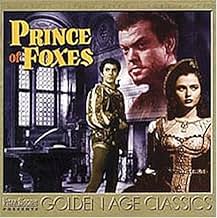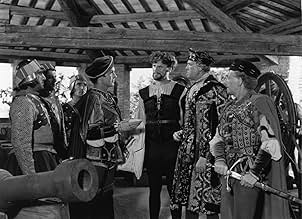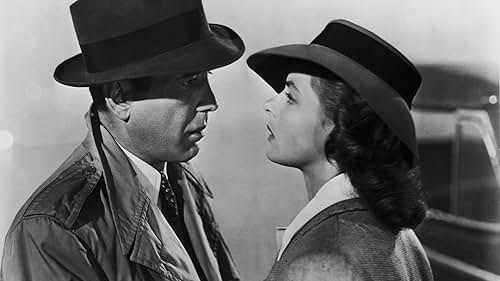IMDb RATING
6.9/10
2.1K
YOUR RATING
An unscrupulous agent for the Borgias suffers a change of heart when asked to betray a noble count and his much younger, very beautiful wife.An unscrupulous agent for the Borgias suffers a change of heart when asked to betray a noble count and his much younger, very beautiful wife.An unscrupulous agent for the Borgias suffers a change of heart when asked to betray a noble count and his much younger, very beautiful wife.
- Nominated for 2 Oscars
- 1 win & 3 nominations total
Adriano Ambrogi
- Townsman
- (uncredited)
Alan Asherman
- Soldier
- (uncredited)
Leslie Bradley
- Don Esteban
- (uncredited)
Eva Brauer
- Beatrice
- (uncredited)
James Carney
- Alphonso d'Este
- (uncredited)
Eduardo Ciannelli
- Art Dealer
- (uncredited)
Franco Corsaro
- Mattia
- (uncredited)
Eugene Deckers
- Borgia Henchman
- (uncredited)
Ludmilla Dudarova
- Vittoria
- (uncredited)
Giuseppe Faeti
- Priest
- (uncredited)
Kenneth Lang
- Soldier
- (uncredited)
- Director
- Writers
- All cast & crew
- Production, box office & more at IMDbPro
Featured reviews
Once again, Welles astounds with his talent. Even though he is not listed in this film's credits as director or writer, the great Welles has left indefatigable stamp of genius on this film. His fascination and artistic absorption with great, unbridled power, moral resistance to that power and the response of the artist has once again propelled him to greatness.
His is a fascinating, swaggering, bemused, sly (as the title implies) impression of the all-powerful Borgia and his near success at corrupting the artist, Orsini. Shades of Citizen Kane and Harry Lyme..?
Naturally, there is a weaselly accomplice (Sloan), and he is terrific too. I found Tyrone Power's performance more than adequate -- for once. Production values were good, too.
But the keynote of the entire production is the masterful Welles. His portrayals are a joy to encounter, maybe because he finds the rich and powerful entertainingly evil, while the rest of us poor mortals find them too intimidating to even acknowledge.
Who cares about Welles' "troubles with Hollywood"? Skip the gossip, people, and THINK about his characters' motives and behavior. And their relevance.
(Talk is cheap. It is easy for the American Film Institute to call Citizen Kane the number one movie of all time, but which side were they on when Welles was being persecuted by his Hollywood peers? And where are they now, when talented independent filmmakers are trying to get their "dangerous" films shown -- or recognized)?
The fact is, with or without support or financing, Welles was in a class by himself. His brilliant mind, rampant creativity, sheer acting ability, courage, originality and artistic integrity have yet to be matched.
There will never never be another Welles...
Back to Prince of Foxes. This is an underrated film. See it for Welles' sake, see it for a Renaissance flash, or just see it for Everett Sloan's eyeballs...
His is a fascinating, swaggering, bemused, sly (as the title implies) impression of the all-powerful Borgia and his near success at corrupting the artist, Orsini. Shades of Citizen Kane and Harry Lyme..?
Naturally, there is a weaselly accomplice (Sloan), and he is terrific too. I found Tyrone Power's performance more than adequate -- for once. Production values were good, too.
But the keynote of the entire production is the masterful Welles. His portrayals are a joy to encounter, maybe because he finds the rich and powerful entertainingly evil, while the rest of us poor mortals find them too intimidating to even acknowledge.
Who cares about Welles' "troubles with Hollywood"? Skip the gossip, people, and THINK about his characters' motives and behavior. And their relevance.
(Talk is cheap. It is easy for the American Film Institute to call Citizen Kane the number one movie of all time, but which side were they on when Welles was being persecuted by his Hollywood peers? And where are they now, when talented independent filmmakers are trying to get their "dangerous" films shown -- or recognized)?
The fact is, with or without support or financing, Welles was in a class by himself. His brilliant mind, rampant creativity, sheer acting ability, courage, originality and artistic integrity have yet to be matched.
There will never never be another Welles...
Back to Prince of Foxes. This is an underrated film. See it for Welles' sake, see it for a Renaissance flash, or just see it for Everett Sloan's eyeballs...
You have to understand that Samuel Shellabarger who wrote Prince of Foxes and Captain from Castile, along with several other sabre-rattling novels of the renaissance, was a very popular writer in the 40s and this movie captures much of the romantic mood of his novels. Tyrone Power had appeared earlier in Captain from Castile which had been a hit and this effort including the great Orson Welles as Cesare Borgia, and two great character actors, Katrina Paxinou and Everett Sloane, was a fantastic production. Wanda Hendrix, who was never any great shakes beyond presenting a pretty Hollywood face, did not distract from the film but the scene chewing between Power, Sloane and, of course, Welles (before he became so obese), is classic. Power with his dark handsome Irish face was always delightful in these heroic roles tinged with darkness. Recall that this film was of the same time period as his classic Nightmare Alley. It is an entertaining yarn but, alas, no video or DVD at this writing, so you'll just have to look for it on the late show. Do so because if you like the romantic golden oldies with a bit of swash and buckle, you'll dang sure like this one.
This is the only film whose producer ever rented a country. The tiny country rented to become "Citta del Monte" in Samuel Shellabarger's well-plotted "Prince of Foxes" was actually the real country of Andorra. The historical novel on which this beautifully-paced and emotionally satisfying film was made left Milton Krims, scenarist, with an unsolvable problem--which he proceeded to solve. The plot line involved Tyrone Power as ambitious young Andrea Orsini with Cesare Borgia's scheme to unite and rule Italy; Orson Welles does well as a charismatic Borgia, whose plan it is to marry his sister played by Marina Berti to the Duke of Ferrara; poison will follow, and the key to Italy will drop from the dying Duke's hand into his own grasp. But Andrea must first perform a mission involving the betraying of the strategic Citta Del Monte into Borgia's hands. His Mother, played by Katina Paxinou, is horrified when she hears what he is becoming; and during the mission, undertaken with Everett Sloane as an assassin he takes into service-- his own death having been the one planned--he decides to serve the Lord of the city, ably played by Felix Aylmer and also his daughter, with whom he if falling in love, miscast but hard-working Wanda Hendrix. The final battle is fought, and a happy ending is achieved--for all save Cesare Borgia and those whose death his schemes have wasted. This is a beautiful B/W drama, with lovely sets by Thomas Little,, Alfred Newman's fine music, Leon Shamroy's exquisite photography and period costumes by Vittorio Nino Novarese that I found unforgettable. Kudos also go to Roy D. Webb as 2nd Unit Director for the action scenes that relieve the very competent dialogue portions expertly crafted by director Henry King. This film, which could have been badly made, glows like a ruby set in the hilt of a dagger flashing back the rays of a spring sun. It is well-remembered, and a benchmark of a production against which other historical dramas are measured still.
I seem to recall reading somewhere that one of Darryl F. Zanuck's reasons for not bestowing three-strip Technicolor on this otherwise all-the-amenities production was that he was peeved at Tyrone Power, still under contract to 20th-Century Fox at the time, for turning down numerous scripts. That's probably an apocryphal bit of trivia since it wasn't very easy for contractees to turn down very many scripts without a dreaded (and costly) suspension, and also one might guess that the amount of frozen lira available for the extensive location shooting of this stunning swashbuckler wasn't as munificent as would have been needed to ship those cumbersome three-strip Technicolor cameras to Italy and to complete the expensive process of photography and the preparation of final release prints. But there's no doubt that color cinematography would have enhanced the final result.
Nevertheless, as other comments on this title attest, the completed film is one that repays repeated viewings. When I first saw it on a TV broadcast I was especially impressed with Henry King's direction, somehow more flexible and attuned to his actors' capabilities than many of the productions which he helmed on U.S. soundstages. I'll certainly add my praise to other IMDbers' encomiums for the male members of the cast, but there should also be a word of thanks for the lovely Wanda Hendrix's portrayal, convincing as a devoted wife of a much older husband, and the brief appearance as the treacherous Angela Borgia by Marina Berti, whose beauty was soon to grace the Technicolored screen as Eunice in M-G-M's "Quo Vadis?" two years later.
And this film also boasts one of my favorite scores by Alfred Newman. From the main title's opening bars, one knows that this is one of his best achievements, with an exciting sweep and, as the film unfolds, a masterful enhancement of the script's many nuances. This one truly deserves a video release. How about it, Fox Studio Classics?
Nevertheless, as other comments on this title attest, the completed film is one that repays repeated viewings. When I first saw it on a TV broadcast I was especially impressed with Henry King's direction, somehow more flexible and attuned to his actors' capabilities than many of the productions which he helmed on U.S. soundstages. I'll certainly add my praise to other IMDbers' encomiums for the male members of the cast, but there should also be a word of thanks for the lovely Wanda Hendrix's portrayal, convincing as a devoted wife of a much older husband, and the brief appearance as the treacherous Angela Borgia by Marina Berti, whose beauty was soon to grace the Technicolored screen as Eunice in M-G-M's "Quo Vadis?" two years later.
And this film also boasts one of my favorite scores by Alfred Newman. From the main title's opening bars, one knows that this is one of his best achievements, with an exciting sweep and, as the film unfolds, a masterful enhancement of the script's many nuances. This one truly deserves a video release. How about it, Fox Studio Classics?
This is a highly unusual movie simply because of the subject matter--the Borgias and the consolidation of power in the Italian states during the 15th and 16th centuries. I've gotta admit that this earns an extra point or two just for originality. Power plays a soldier of fortune--a role he is well suited for, as in many ways, it's almost like his pirate movies or Zorro! So, the transition is smooth. Also, the story and supporting actors are excellent. I recommend this film especially to lovers of old films and adventure movies. I think some teens and kids would also enjoy it, but considering the short attention-spans of most kids these days, you might think twice before having them watch this movie (or just force them to watch because it's good entertainment by gum!).
Did you know
- TriviaOrson Welles made this film during one of the several breaks in the filming of his own Othello (1951) (which he began in 1949 and which was not finished until 1951). Everett Sloane, whom he had cast as Iago in his own film, came with him into this one, with his role built up by extensive script rewrites by the uncredited Welles. This may have been partly an attempt by Welles to ensure that Sloane remained with him to complete "Othello" --- but, in fact, Sloane walked off the film, creating an extra difficulty for Welles, who never forgave him.
- GoofsThis story takes place during the time of Cesare Borgia, who died in 1507; however, the first scene of the movie--which shows Borgia with other characters--takes place in a room decorated with a fresco of Saint Michael by Federico Zuccari, who was born around 1540, and who started to work in Rome during the reign of HH Pius IV (1559-1565).
- Quotes
Cesare Borgia: It is my belief that everything, even death, can be turned into profit.
- ConnectionsEdited into The Saracen Blade (1954)
- How long is Prince of Foxes?Powered by Alexa
Details
- Release date
- Country of origin
- Languages
- Also known as
- El príncipe de los zorros
- Filming locations
- Production company
- See more company credits at IMDbPro
Box office
- Budget
- $4,500,000 (estimated)
- Runtime
- 1h 47m(107 min)
- Color
- Aspect ratio
- 1.33 : 1
Contribute to this page
Suggest an edit or add missing content



































